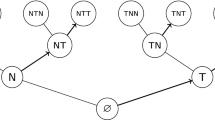Abstract
Wiehagen’s Thesis in Inductive Inference (1991) essentially states that, for each learning criterion, learning can be done in a normalized, enumerative way. The thesis was not a formal statement and thus did not allow for a formal proof, but support was given by examples of a number of different learning criteria that can be learned by enumeration. Building on recent formalizations of learning criteria, we are now able to formalize Wiehagen’s Thesis. We prove the thesis for a wide range of learning criteria, including many popular criteria from the literature. We also show the limitations of the thesis by giving four learning criteria for which the thesis does not hold (and, in two cases, was probably not meant to hold). Beyond the original formulation of the thesis, we also prove stronger versions which allow for many corollaries relating to strongly decisive and conservative learning.
Similar content being viewed by others
Notes
“Ex” stands for explanatory.
We let \(\mathbb {N} = \{0,1,2,\ldots \}\) be the set of natural numbers and we fix a coding for programs based on Turing machines letting, for any program (code) \(p \in \mathbb {N}\), φ p be the function computed by the Turing machine coded to p.
For a linear-time example, see [21, Section 2.3].
h(∅) denotes the initial conjecture (based on no data) made by h.
The function pad was defined in Section 2.
For convenience we write, for all a, z, φ(a, z) instead of φ a (z).
The functions pad and unpad1 were defined in Section 2.
References
Akama, Y., Zeugmann, T.: Consistent and coherent learning with δ-delay. Inf. Comput. 206, 1362–1374 (2008)
Angluin, D.: Inductive inference of formal languages from positive data. Inf. Control 45, 117–135 (1980)
Baliga, G., Case, J., Merkle, W., Stephan, F., Wiehagen, W.: When unlearning helps. Inf. Comput. 206, 694–709 (2008)
Bārzdiņš, J.: Inductive inference of automata, functions and programs. In: Proceedings of the International Congress of Mathematicians, pp. 455–560. English translation in, American Mathematical Society Translations: Series 2 109, pp. 107–112, 1977 (1974)
Beick, H.R.: Induktive Inferenz mit Höchster Inferenzgeschwindigkeit. Dissertation, Humboldt University of Berlin (1984)
Blum, L., Blum, M.: Toward a mathematical theory of inductive inference. Inf. Control 28, 125–155 (1975)
Case, J.: Periodicity in generations of automata. Math. Syst. Theory 8, 15–32 (1974)
Case, J.: Infinitary self-reference in learning theory. J. Exp. Theor. Artif. Intell. 6, 3–16 (1994)
Case, J., Kötzing, T.: Strongly non-U-shaped learning results by general techniques. In: Tauman Kalai, A., Mohri, M. (eds.) COLT 2010 - The 23rd Conference on Learning Theory, Haifa, Israel, June 27–29, 2010, pp. 181–193. Omnipress (2010)
Case, J., Kȯtzing, T.: Learning secrets interactively. Dynamic modeling in inductive inference. Inf. Comput. 220, 60–73 (2012)
Freivalds, R., Karpinski, M., Smith, C.H.: Co-learning of total recursive functions. In: Warmuth, M.K. (ed.) Proceedings of the Seventh Annual ACM Conference on Computational Learning Theory, COLT 1994, New Brunswick, NJ, USA, July 12–15, 1994, pp. 190–197. ACM (1994)
Freivalds, R., Kinber, E., Wiehagen, R.: Inductive inference and computable one-one numberings. Z. Mathe. Logik Grundl. Math. 28, 463–479 (1982)
Gold, E.: Language identification in the limit. Inf. Control 10, 447–474 (1967)
Jain, S., Kinber, E., Lange, S., Wiehagen, R., Zeugmann, T.: Learning languages and functions by erasing. Theor. Comput. Sci. 241, 143–189 (2000)
Jain, S., Osherson, D., Royer, J., Sharma, A.: Systems that Learn: An Introduction to Learning Theory, 2nd edn. MIT Press, Cambridge (1999)
Jantke, K.P.: Monotonic and non-monotonic inductive inference of functions and patterns. In: Dix, J., Jantke, K.P., Schmitt, P.H. (eds.) Nonmonotonic and Inductive Logic, 1st International Workshop, Karlsruhe, Germany, December 4–7, 1990, Proceedings, volume 543 of Lecture Notes in Computer Science, pp. 161–177. Springer (1991)
Jantke, K.P., Beick, H.: Combining postulates of naturalness in inductive inference. Elektron. Inf. Verarb. Kybern. 17, 465–484 (1982)
Kötzing, T.: Abstraction and Complexity in Computational Learning in the Limit. PhD thesis, University of Delaware. Available online at http://pqdtopen.proquest.com/#viewpdf?dispub=3373055 (2009)
Kötzing, T.: A solution to Wiehagen’s thesis. In: Mayr, E.W., Portier, N. (eds.) 31st International Symposium on Theoretical Aspects of Computer Science (STACS 2014), STACS 2014, March 5–8, 2014, Lyon, France, volume 25 of LIPIcs, pp. 494–505. Schloss Dagstuhl - Leibniz-Zentrum fuer Informatik (2014)
Rogers, H.: Theory of Recursive Functions and Effective Computability. McGraw Hill, New York (1967). Reprinted by MIT Press, Cambridge, 1987
Royer, J., Case, J.: Subrecursive Programming Systems: Complexity and Succinctness. Research monograph in Progress in Theor. Comput. Sci. Birkhauser̈, Boston (1994)
Schäfer-Richter, G.: Über Eingabeabhängigkeit und Komplexität von Inferenzstrategien. Dissertation, RWTH Aachen (1984)
Wiehagen, R.: Limes-Erkennung rekursiver Funktionen durch spezielle Strategien. Elektron. Inf. Verarb. Kybern. 12, 93–99 (1976)
Wiehagen, R.: Zur Theorie der Algorithmischen Erkennung. Dissertation B. Humboldt University of Berlin (1978)
Wiehagen, R.: A thesis in inductive inference. In: Dix, J., Jantke, K.P., Schmitt, P.H. (eds.) Nonmonotonic and Inductive Logic, 1st International Workshop, Karlsruhe, Germany, December 4–7, 1990, Proceedings, volume 543 of Lecture Notes in Computer Science, pp. 184–207. Springer (1991)
Zeugmann, T., Zilles, S.: Learning recursive functions: a survey. Theor. Comput. Sci. 397, 4–56 (2008)
Acknowledgments
I would like to thank Sandra Zilles for bringing Wiehagen’s Thesis in connection with the approach of abstractly defining learning criteria, as well as the anonymous reviewers of the conference version and the reviewers for the journal version for their helpful suggestions.
Author information
Authors and Affiliations
Corresponding author
Rights and permissions
About this article
Cite this article
Kötzing, T. A Solution to Wiehagen’s Thesis. Theory Comput Syst 60, 498–520 (2017). https://doi.org/10.1007/s00224-016-9678-0
Published:
Issue Date:
DOI: https://doi.org/10.1007/s00224-016-9678-0




